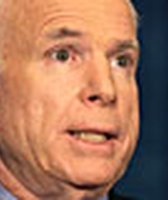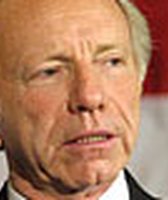Get PolitiFact in your inbox.
SUMMARY: The outcome of this year's Democratic presidential nomination rests largely on whether voters believe Hillary Rodham Clinton or Barack Obama is the true "agent of change" and most capable of getting results. But voters won't get much insight from their voting records in the Senate, which are nearly identical.
In the three years they've served together, the Democratic rivals for the presidency have compiled nearly indistinguishable records. On 38 key votes on big issues taken in 2005, 2006 and 2007 Clinton and Obama voted differently just 3 times.
Out of a total of 910 votes in which both candidates participated, Clinton and Obama differed 54 times, or 5.9 percent of the time. You can see how often they voted with their party or with President Bush here.
Congressional Quarterly determines key votes in Congress each year. The news organization defines a vote to be key by the extent to which it represents a matter of major controversy, a matter of presidential or political power or a matter of potentially great impact on the nation and the lives of Americans.
Here's a look at how Clinton and Obama landed on key votes: (Warning to our readers: The information below gets pretty deep in the weeds of Congress and public policy.)
2007
Clinton and Obama voted the same on 10 of 13 key votes, including yes votes on measures to raise the minimum wage to $7.25 per hour (passed 94-3), to overhaul congressional lobbying and ethics rules (passed 83-14) and to not stop debate on an amendment to a fiscal 2008 defense authorization bill that would have restored habeas corpus rights to enemy combatants (failed 56-43, 60 votes were needed to end debate). By permitting debate to continue, the last vote allowed the Senate to avoid having to directly vote on whether terror suspects held at Guantanamo Bay, Cuba, have the right to challenge their incarceration in U.S. courts.
Both candidates voted no on a measure to amend a foreign intelligence law to give the attorney general and director of national intelligence expanded authority to conduct warrantless surveillance of terror suspects (passed 60-28).
They both missed these three votes:
• Nov. 8: A vote on whether to override President Bush's Nov. 2 veto of a bill to authorize $23.2-billion for more than 900 flood control, navigation and environmental projects and studies by the Army Corps of Engineers. (Senate overrode with more than the required two-thirds majority 79-14).
• Nov. 8: A vote on whether to confirm President Bush's nomination of Michael Mukasey to be attorney general. (confirmed 53-40). Both spoke publicly against him.
• Dec. 18: A vote on a motion that would have amended the fiscal 2008 omnibus spending package by replacing $31-billion in funding for the war in Afghanistan with $70-billion to fund the war in Iraq as well as in Afghanistan. (motion agreed to 70-25).
2006
Clinton and Obama voted the same on 11 of 12 key votes. Their only split came on a July 11 vote on an amendment to a fiscal 2007 homeland security spending bill that gave the Federal Emergency Management Agency new authority within the Department of Homeland Security instead of removing it from the department. The move was a direct response to FEMA's response to Hurricane Katrina and dealt with revamping the agency's structure and responsibilities. Obama voted yes, Clinton voted no (amendment adopted 87-11). With Democratic Sen. Daniel K. Akaka of Hawaii, Clinton unsuccessfully offered an alternative that would have made FEMA an independent, Cabinet-level agency whose director would report directly to the president.
Among other key votes, the candidates both voted to make permanent 14 provisions of the 2001 anti-terrorism law known as the Patriot Act (conference report adopted 89-10). They both voted yes on a bill by Republican John McCain and Democrat Edward M. Kennedy to overhaul U.S. immigration policy and create a guest worker program and a path to citizenship for illegal immigrants (passed 62-36). They both also supported an amendment to a fiscal 2007 defense authorization bill that expressed the sense of Congress that the United States should begin withdrawing troops from Iraq by the end of 2006 (rejected 39-60).
Clinton and Obama both voted against confirming Samuel A. Alito to the Supeme Court (confirmed 58-42) and against a $70-billion tax-cut package that included a two-year extension of lower rates for dividends and capital gains, along with a one-year exemption from the alternative minimum tax for many middle-class taxpayers (conference report adopted 54-44).
2005
Clinton and Obama voted differently on two of 16 key votes. In what could be interpreted as their only significant ideological split, Obama on Feb. 10 voted for and Clinton against a bill designed to curb class-action lawsuits by shifting jurisdiction over many such cases into federal court. The bill had been a priority of business interests, who spent six years lobbying for the measure (passed 72-26).
On July 29, Obama voted for and Clinton opposed an energy bill that included incentives for greater production of oil, gas, coal and nuclear power and also encouraged conservation and a reduction in the regulation of the electric power industry (conference report adopted 74-26). The final passage culminated a grinding, four-year debate on energy policy.
The pair voted in favor of measures such as an amendment to a bankruptcy bill that would have prohibited protesters such as anti-abortion groups from escaping court-ordered fines or judgments by filing for bankruptcy protection (rejected 46-53) and an amendment McCain offered to a fiscal 2006 defense spending bill that banned cruel, inhuman or degrading treatment of enemy combatants and required military interrogators to rely on an Army field manual that complies with the Geneva Conventions (adopted 90-9).
They both voted against the confirmation of John Roberts to the Supreme Court (confirmed 78-22), voted no on a bill that would bar certain civil lawsuits against gun manufacturers, dealers and importers (passed 65-31) and voted no on a motion to limit debate on a fiscal 2006 defense spending bill because of a controversial provision that would have opened Alaska's Arctic National Wildlife Refuge to oil and gas exploration (failed 56-44, 60 votes were needed to end debate). By voting to allow debate to continue, Clinton and Obama were effectively voting to halt the pro-drilling measure.
Our Sources
2005 CQ Almanac
2006 CQ Almanac
"Key Votes of 2007," CQ Weekly, Jan. 7, 2008.
"The Space Between Them," CQ Weekly, Jan. 14, 2008, by David Nather.





































